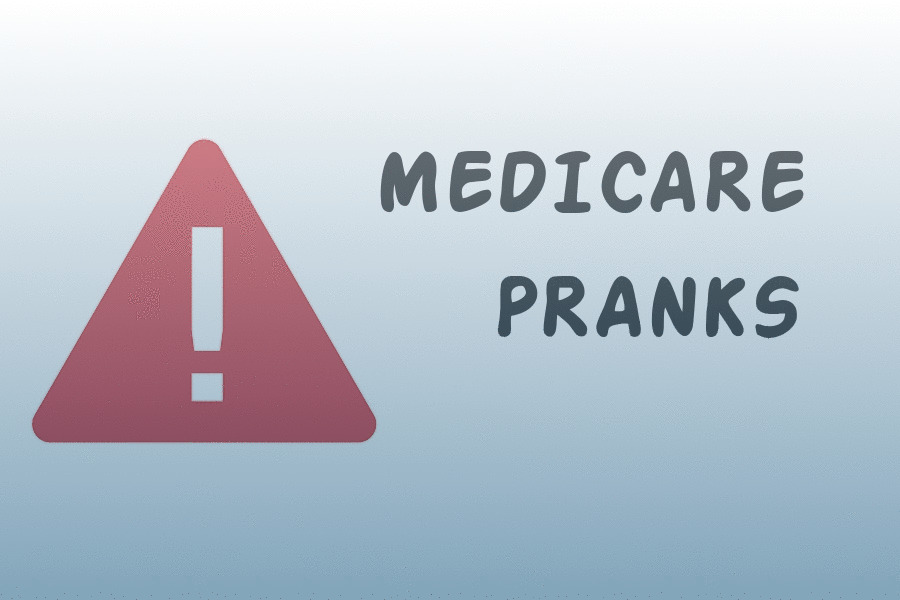If you get tricked by a clever April Fool’s Day prank, you can laugh it off. If you get tricked by a common Medicare misconception, it’s no laughing matter. Medicare mistakes can be expensive, and there are enough Medicare myths out there to make even the wisest person look foolish. Make sure you’re not being fooled by these common Medicare misconceptions.
![]() False: You Can Sign Up When Your Spouse Turns 65
False: You Can Sign Up When Your Spouse Turns 65
If you’ve been on your spouse’s job-based health insurance for years, it seems pretty reasonable to assume that you’ll be covered by their Medicare plan, too, but that’s not how it works. You can qualify for premium-free Medicare Part A based on your spouse’s work history, but you won’t be able to enroll in a plan until you turn 65 or meet the disability or End-Stage Renal Disease eligibility requirements.
When you turn 65, you will have a seven-month Initial Enrollment Period. This period actually starts three months before your birthday month, and if you want coverage to start as soon as possible, that’s when you should sign up. In the meantime, you might be able to get health insurance through COBRA or the Health Insurance Marketplace. You can also purchase coverage with the help of an insurance agent.
![]() False: Long-Term Care Is Covered
False: Long-Term Care Is Covered
The Administration for Community Living says that most seniors will need long-term care at some point. Given this, you might assume that Medicare provides coverage for long-term care. Unfortunately, it doesn’t really. Medicare provides limited coverage for skilled nursing care in some situations, and some Medicare Advantage plans offer extra coverages for things like adult day care. However, many seniors are surprised to find that their assisted living home and custodial nursing care costs are not covered.
![]() False: You Can Sign Up Whenever You Want
False: You Can Sign Up Whenever You Want
Medicare enrollment periods can get complicated, so it’s understandable if people get confused. When you turn 65, you’ll have access to a seven-month Initial Enrollment Period, which starts about three months before your birthday. If you miss this period, you may be able to enroll during a Special Enrollment Period if you qualify for one, for example, because you had and then lost qualifying group health coverage from a job. Otherwise, you’ll have to wait for the General Enrollment Period, which occurs during the first three months of each year, and you might end up getting charged expensive late fees.
![]() False: You Can’t Be Denied Medigap Coverage
False: You Can’t Be Denied Medigap Coverage
Many seniors have various pre-existing conditions, such as a history of heart disease or cancer. You don’t have to worry about being denied Original Medicare or Medicare Advantage coverage based on your medical history. However, you could be denied Medicare Supplement Insurance coverage, also called Medigap.
When you first enroll in Medicare Part B, you will be given a six-month Medigap Open Enrollment Period. If you enroll in a plan during this time, there will be no medical underwriting. This means you don’t have to worry about being denied coverage or charged more based on a pre-existing condition. However, if you try to enroll after this period is over, medical underwriting can be used to deny you coverage or increase your premium costs.
![]() False: Medicare Is Free
False: Medicare Is Free
You spend your entire working life paying Medicare taxes, so you can be forgiven for assuming that when you finally qualify for coverage, it will be free. Unfortunately, this isn’t the case. In fact, a report from AARP found that people in Original Medicare spent an average of $6,168 on premiums and medical services in 2018, and 10% of enrollees spent $10,816 or more.
Most people qualify for premium-free Medicare Part A based on their work history, but beneficiaries have to pay a premium for Medicare Part B, and some people pay more based on their income. You might pay an additional premium for other types of coverage, like Medicare Part D, Medigap or Medicare Advantage, although some Medicare Advantage plans have $0 premiums. When you receive care, you may also have to pay deductibles, copays and other out-of-pocket costs.
![]() The Good News
The Good News
The good news is that you can manage your costs by selecting a plan that works for you. Review the networks, drug formularies and coverages carefully.
Medicare can be confusing, so it’s no wonder that so many people get taken in by common Medicare misconceptions. Medicare Educators is here to help. Contact us.

